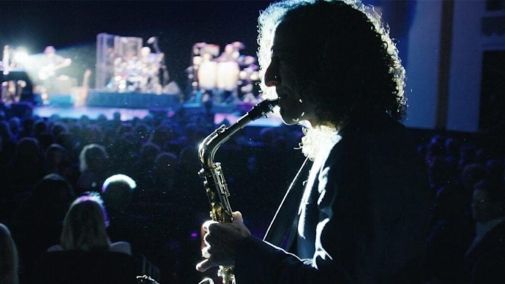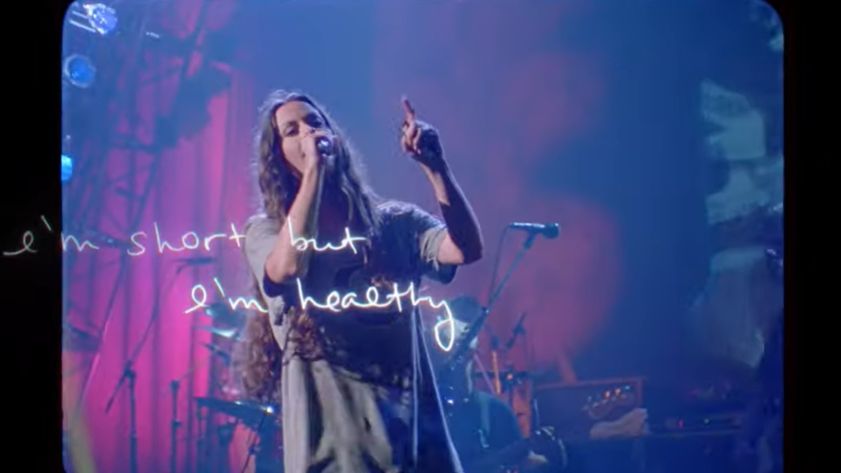Doc Corner: 'Listening to Kenny G' and 'Jagged' at DOC NYC
 Wednesday, November 10, 2021 at 9:00PM
Wednesday, November 10, 2021 at 9:00PM By Glenn Dunks
DOC NYC starts today. The festival runs for in-person screenings from November 10–18 and then continues online until November 28. I have a Twitter thread covering what I am watching, but here we are looking at two music docs about artists from very different ends of the spectrum: Kenny G and Alanis Morissette.

Trust director Penny Lane to make a biographic documentary about a musician and have it not be the same old same old. The American filmmaker has been on a tear lately with Nuts! (about goat testicle charlatans), The Pain of Others (about Morgellons disease), and Hail Satan! (about the Satanic Temple). This run continues with the wittily assembled Listening to Kenny G, which plays today as the opening night film of DOC NYC.
Lane’s film isn’t the standard musician bio-doc, although it does chart his career from the early days discovering music in school and does make a spotlight out of his career highs and lows. What makes Listening to Kenny G so invigorating of a watch is because of the greater story within which this narrative is placed. One that interrogates the controversial anti-populous appeal of the multi-instrumentalist’s smooth jazz stylings from all angles.
It’s easy to tell a linear narrative for somebody like Kenny G. Born Kenneth Gorelick, he would go on to become one of the highest-selling musicians of all time with the sort of pastel-hued muzak that pushed so called ‘easy listening’ to the mainstream. As attested to by his mammoth record sales, G is a beloved musician who to the present day remains a cultural icon in ways that bely the aggressive and targeted abuse he received in his best-selling heydays of 1986’s “Songbird” through to the late 1990s.

Kenny G himself, all curls and (somewhat uncomfortably?) lean muscle, is a lively subject, but Lane wisely lines up a varied list of talking heads alongside him. Not all of whom are fans. The idea that popular art is almost always inferior is hardly a new concept with which to grapple, but docs like this rarely examine it with such ease and flair. Pop artists are constantly needing to reaffirm they are just as serious as the others who Rolling Stone or Pitchfork might devote column inches to. For some, the culture eventually shifts in their direction—anybody who claims Taylor Swift isn’t one of the greatest songwriters of our time would today be rightly laughed out of the room. But such isn’t the case with Kenny G, and this friction is where Listening garners most of its enticing allure as he makes a case for his musicianship credentials while also admitting that he’s a showman for the masses first and foremost.
That Kenny G isn’t all that interesting of a subject doesn’t really matter because this is a film that is smarter than most. For all intents and purposes, he has a led a perfectly privileged life of success, fame and wealth while being allowed to engage in the art he loves to a fanbase who covet what he does (he was also one of the first investors of Starbucks, which certainly helps). He doesn’t always come off as likeable, but he does always come off as aware, which is probably more important. A clear rapport between Lane is felt and Kenny G is open to the many burrows of his career within which she wants to navigate. In a sense, he reminds me a lot of Dolly Parton—you can’t make jokes about him if he does it first.
The film is smartly edited by Adam Bolt and Cindy Lee, finding its own rhythms within Kenny G’s oeuvre. Much of the film’s success is down to them. I am not a fan of Kenny G’s musical doodlings, but that hardly matters here when the film is so fresh. Listening to Kenny G is joyous in celebrating the musical oddity that is his career alongside the more respectable jazz musicians who many claim he is desecrating the memories of. It’s smart and funny and one of the best documentaries of the year.
 Interestingly, another film at DOC NYC is something of its inverse. Where Listening to Kenny G looks at some of the musical controversies that have plagued his career soundtracking airport lounges and malls, Alison Klayman’s Jagged has found its rather standard story of musical genius plagued by controversy after the fact. The film’s primary subject, Canadian rockstar Alanis Morissette has come out in protest against the film and said she will not be supporting its release.
Interestingly, another film at DOC NYC is something of its inverse. Where Listening to Kenny G looks at some of the musical controversies that have plagued his career soundtracking airport lounges and malls, Alison Klayman’s Jagged has found its rather standard story of musical genius plagued by controversy after the fact. The film’s primary subject, Canadian rockstar Alanis Morissette has come out in protest against the film and said she will not be supporting its release.
Why, exactly, I am not sure. Her statement to Pitchfork was somewhat vague about the particulars, although claims the film “includes implications and facts that are simply not true.” Without the knowledge of this—which broke ahead of the film’s Toronto premiere in September—I wouldn’t have bet money on anybody objecting to its rather rudimentary telling of how Morissette’s genuinely iconic Jagged Little Pill album came to be. That isn’t to say Jagged is bad. It gets expectedly strong mileage out of the endless number of amazing song cues—it would be really hard not to with one of the greatest albums of all time. Much of the archival footage, too, is really well edited and something die-hard fans and relative novices alike will adore (much of it taken by Morissette herself on stage during the album’s extensive world tour).
So, what then is there to object to? Artists aren’t always the best judge of art made about them, it’s true. Morissette herself appears throughout discussing the beginning of her career as a Canadian pop star through to the rough production of Jagged Little Pill and the ensuing publicity avalanche that came with it as it went on to sell 33 million copies. Now 47, Morissette details some of the frustrations she felt like her discovery that the band was using Alanis’ name to pull chicks on the road, although Klayman doesn’t dig too deep on those. Madonna is briefly mentioned, but nothing salacious there. Discussions of her rape are featured, too, but despite the toughness of the topic, it has been well-documented before.

As for the film we have been given: It’s well made and Morissette makes for a captivating figure. It’s a case of the allure of her story and her experience clearly influencing the music as much as her music has influenced her future story. We may never know what Alanis disagreed so passionately about, but Jagged is a nice tribute, albeit one that misses out on being as emphatically in-your-face as the music it celebrates.
Elsewhere:
While I didn’t get a chance to watch Dionne Warwick: Don’t Make Me Over, I did see two other music docs playing the festival. The first, Dean Martin: King of Cool is exactly the film you think it’s going to be. It will sit nicely alongside Sammy Davis Jr.: I’ve Gotta Be Me and any number of Sinatra docs. More interesting is Mimaroğlu: The Robinson of Manhattan Island by Serdar Kokceoglu, which is an experimental portrait of the pioneering Turkish electronic musician. Using Mimaroğlu’s own rough-shot video footage of 1960s New York against a lush soundscape, it captures the underground cutting edge in evocative fashion.



Reader Comments (5)
Kenny G still sucks. He ruined jazz music and made it into schmaltz.
Cue laughter.
[double post]
working stiff -- you have to be kidding. Taylor Swift has more than proved that she is enormously gifted as a composer. So many songs and so many of them are excellent. "folklore" and "evermore" were both amazing album. Somehow she's both quantity and quality.
@ Nathaniel
If “our time” means the last five years, then maybe. But for me a phrase like “one of the greatest songwriters of our time” implies this entire generation and all the artists still alive today (whether or not they are currently active). And TS doesn’t even crack my top 20 list. I would have the same reaction if someone described Beyoncé as “one of the greatest singers of our time.”